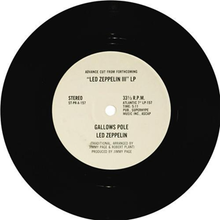Seven Curses
| "Gallows Pole" | |
|---|---|

Advance copy 5:11 stereo 7-inch 33⅓ rpm
|
|
| Song by Led Zeppelin | |
| from the album Led Zeppelin III | |
| Released | 5 October 1970 |
| Recorded | Headley Grange, England, 1970 |
| Genre | Folk rock, blues rock |
| Length | 4:58 |
| Label | Atlantic |
| Songwriter(s) | Traditional, arranged by Jimmy Page, Robert Plant |
| Producer(s) | Jimmy Page |
"The Maid Freed from the Gallows" is one of many titles of a centuries-old folk song about a condemned maiden pleading for someone to buy her freedom from the executioner. In the collection of ballads compiled by Francis James Child in the late 19th century, it is indexed as Child Ballad number 95; 11 variants, some fragmentary, are indexed as 95A to 95K. In the Roud Folk Song Index it is number 144. The ballad exists in a number of folkloric variants, from many different countries, and has been remade in a variety of formats. For example, it was recorded in 1939 as "The Gallis Pole" by folk singer Huddie "Lead Belly" Ledbetter, and - the most famous version - in 1970 as "Gallows Pole", an arrangement of the Fred Gerlach version by English rock band Led Zeppelin, on the album Led Zeppelin III.
There are many versions, all of which recount a similar story. A maiden (a young unmarried woman) or man is about to be hanged (in many variants, for unknown reasons) pleads with the hangman, or judge, to wait for the arrival of someone who may bribe him. Typically, the first person (or people) to arrive, who may include the condemned person's parent or sibling, has brought nothing and often has come to see them hanged. The last person to arrive, often their true love, has brought the gold, silver, or some other valuable to save them. Although the traditional versions do not resolve the fate of the condemned one way or the other, it may be presumed that the bribe would succeed. Depending on the version, the condemned may curse all those who failed them.
...
Wikipedia
